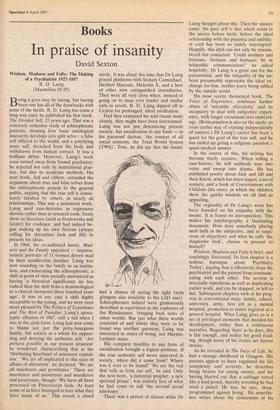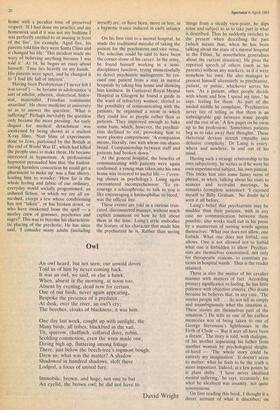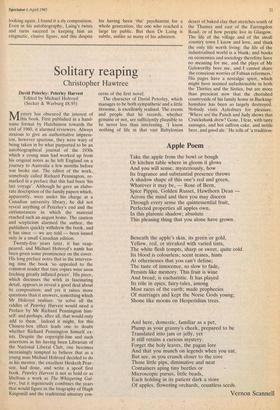Books
In praise of insanity
David Sexton
Wisdom, Madness and Folly: The Making of a Psychiatrist 1927-1957 R. D. Laing (Macmillan £9.95) eing a guru may be taxing, but having 1.1 been one has all of the drawbacks with none of the thrills. R. D. Laing has come a long way since he published his first book, The Divided Self, 25 years ago. That was a relatively orthodox study of schizophrenic patients, showing how basic ontological insecurity develops into split selve..: a false self offered to the world, and a petrifying inner self, detached from the body and withdrawn from human contact. It was a brilliant debut. However, Laing's work soon turned away from formal psychiatry; he rejected not only its institutional prac- tice, but also its academic methods. His next book, Self and Others, extended the argument about true and false selves from the schizophrenic patient to the general public, arguing that the true self is consis- tently falsified by others, in nearly all relationships. This was a polemical work; Laing used case-histories as expressive devices rather than as research tools, freely drew on literature (such as Dostoevsky and Genet) for evidence, and had indeed be- gun making up his own fictions (always calling his characters Jack and Jill) to present his ideas.
In 1964, the co-authored Sanity, Mad- ness and the Family appeared — impress- ionistic portraits of 11 women driven mad by their insufferable families. Laing was now rounding on the family as an institu- tion, and exonerating the schizophrenic, a shift in point of view proudly announced as having 'a historical significance no less radical than the shift from a demonological to a clinical viewpoint three hundred years ago'. It was in any case a shift highly acceptable to the young, and we were even
more pleased by The Politics of Experience and The Bird of Paradise, Laing's apoca- lyptic effusion of 1967, still a fad when I was in the sixth form. Laing had now come to blame not just the petty-bourgeois family, but society as a whole for oppres- sing and denying the authentic self. 'Are persons possible in our present situation' he wondered, characterising that as the 'fibrillating heartland of senescent capital- ism'. 'We are all implicated in this state of affairs of alienation', he declared, 'We are all murderers and prostitutes.' There are murderers and prostitutes and murderers and prostitutes, though: 'We have all been processed on Procrustean beds. At least some of us have managed to hate what they have made of us.' This struck a chord nicely. It was about this time that Dr Laing graced platforms with Stokely Carmichael, Herbert Marcuse, Malcolm X, and a host of other now extinguished incendiaries. They were all very cross when, instead of going on to issue ever louder and similar calls to revolt, R. D. Laing slipped off to Ceylon for prolonged, silent meditation.
Had they examined his acid classic more closely, they might have been forewarned. Laing was not just denouncing present society, but socialisation in any form — in his paranoid diction, 'the context of all social contexts, the Total World System (TWS)'. True, he did say that the insane had a chance of seeing the light (with glimpses also available to the LSD user). Schizophrenics indeed were glamorously described as equivalent to the explorers of the Renaissance, bringing back news of other worlds. But just what these worlds consisted of and where they were to be found was another question; Laing was interested in states of being, not Marxist- Leninist states.
His complete hostility to any form of socialisation brought a logical problem. If the true authentic self never appeared in society, where did it come from? Where was it ever to be found? 'We are the veil that veils us from our self,' he said. Only the new-born, 'a potential prophet, a new spiritual prince', was entirely free of what he had come to call 'the normal social lobotomy'.
There was a period of silence while Dr Laing thought about this. Then the answer came: the pure self is that which exists in the uterus before birth, before the ideal relationship with the placenta and umbilic- al cord has been so rudely interrupted. Happily, this idyll can not only be remem- bered but contacted: 'Could mothers and foetuses, foetuses and foetuses; be in telepathic communciation?' he asked hopefully. Dr Laing is a great one for the paranormal, and the telepathy of the un- born presumably represents the ideal ex- change for him, neither party being sullied by the outside world.
His most recent theoretical book, The Voice of Experience, combines further abuse of 'scientific objectivity' and its incapacity to deal with subjective experi- ence, with longer excursions into embryol- ogy. (Reincarnation is also on the cards: an even earlier way of existing independently of context.) Dr Laing's career has been a quest for the grail of the true self, and he has ended up giving a religious question a quasi-medical answer.
In the course of this, his writing has become freely creative. When telling a case-history, he will suddenly soar into verse and sweep into drama. He has published poetry about Jack and Jill and their Knots, which has been staged, a set of sonnets, and a book of Conversations with Children (his own), in which the children show the quirky wisdom we all find so appealing.
The orginality of Dr Laing's work has been founded on his empathy with the insane. It is based on introspection. This makes his autobiography a fascinating document. How does somebody placing such faith in the subjective, and so suspi- cious of objectivity and what he calls 'the diagnostic look', choose to present to himself?
Wisdom, Madness and Folly is brief, and touchingly illustrated. Its first chapter is a tedious harangue about 'Psychiatry Today', arguing that it effectively stops the psychiatrist and the patient from communi- cating with each other. The section is internally repetitious as well as duplicating earlier work, and can be skipped, or left to last. Subsequent chapters look at his prog- ress in conventional steps: family, school, university, army, first job in a mental hospital, promotion to senior registrar at a general hospital. What Laing gives us is a set of privileged moments that decided his development, rather than a continuous narrative. Regarding 'facts' as he does, this is fair enough, and makes for good read- ing, though many of his stories are horror stories.
As he revealed in The Facts of Life, he had a strange childhood in Glasgow. His parents appear to have regulated his life completely and' severely: he describes being beaten for eating sweets, and for having blurted out that a cabbage tasted like a lead pencil, thereby revealing he had tried a pencil. He was, he says, 'deep- programmed against living'. He nonethe- less writes about the restrictions of his home with a peculiar tone of preserved respect: 'If I had done my practice and my homework and if it was not my bedtime I was perfectly entitled to sit musing in front of the fire', for example. Aged five, his parents told him they were Santa Claus and it changed his life: 'This incident made me wary of believing anything because I was told it.' At 14, he began an essay about himself: 'Time lies heavily on my hands.' His parents were upset, and he changed it to 'I find life full of interest'.
Having been Presbyterian ('I never felt I was saved') — he became in adolescence 'a sort of nihilist, atheistic, dialectical, histor- ical, materialist, Freudian communist anarchist'. He chose medicine at university so as to answer the question: 'What is suffering?' Perhaps inevitably the question only became the more pressing. An early disgust for medical detachment was awakened by being shown as a student X-ray films, 'Nazi films of experiments done to Jews, purloined by the British at the end of World War II', which had killed the people used to make them. He became interested in hypnotism. A professional hypnotist persuaded him that 'the foulest- tasting harmless concoction he could get a pharmacist to make up' was a fine sherry, leading him to wonder: 'How far is the whole feeling and fabric of our ordinary, everyday world socially programmed, an induced fiction, in which we are all en- meshed, except a few whose conditioning has not "taken", or has broken down, or who have awakened from the spell — a motley crew of geniuses, psychotics and sages?' This was to become his characteris- tic placing of the psychotic. He has since said, consider many adults (including myself) are, or have been, more or less, in a hypnotic trance induced in early infancy On his first visit to a mental hospital, he made the traditional mistake of taking the patient for the psychiatrist and vice versa. The solecism could be said to have been the corner-stone of his career. In the army, he found himself working in a semi- disciplinary function, trying unsuccessfully to detect psychiatric malingerers: he res- cued one patient from a stay in mental hospitals by taking him home and showing him kindness. In Gartnavel Royal Mental Hospital in Glasgow he found a guide in the ward of refractory women; alerted to the possibility of communicating with the patients, he organised a room in which they could live as people rather than as patients. They improved enough to bake some buns, which, however, the psychiat- rists declined to eat, provoking him to more gloomy comparisons: 'A companion means, literally, one with whom one shares bread. Companionship between staff and patients had broken down.'
At the general hospital, the benefits of communicating with patients were again confirmed: a young man taken into his own home was restored to useful life — ('even- ing classes in psychology'). Laing again encountered incomprehension: `To en- courage a schizophrenic to talk to you is like encouraging a haemophiliac to bleed,' was the official line.
These events are told in a curious trun- cated, disconnected manner, without much explicit comment on how he felt about them at the time. Laing's style embodies the feature of his character that made him the psychiatrist he is. Rather than seeing things from a steady view-point, he slips tense and subject so as to take part in what is described. Thus he suddenly switches to the present when describing the past (which means that, when he has been talking about the state of a mental hospital in the Fifties, he nonetheless generalises about the current situation). He gives the reported speech of others (such as his parents) without any markers, as if it were somehow his own. He also manages to present himself alternately as psychiatrist, patient, or public, whichever serves his turn. 'As a patient, other people decide with whom and how I spend my time,' he says, feeling for them. As part of the misled middle he complains, 'Psychiatrists never tire of telling us that there is an unbridgeable gap between some people and the rest of us.' A few pages on he owns up to his profession: 'Sometimes patients beg us to take away their thoughts.' These rhetorical devices stretch empathy into delusive complicity: Dr Laing is every- where and nowhere, in and out of his mind.
Having such a strange relationship to his own subjectivity, he writes as if he were his own experimental subject, his own patient. This tricks him into some funny turns of phrase, as when, talking about his visits to seances and revivalist meetings, he remarks (complete sentence): 'I exposed myself to Billy Graham.' No doubt he'd seen it all before.
Laing's belief that psychiatrists may be madder than their patients, with in any case no communication between them possible, also works itself out in his prose by a mannerism of turning words against themselves: 'What one does not allow, one forbids. What one does not forbid, one allows. One is not allowed not to forbid what one is forbidden to allow. Psychiat- rists are themselves constrained, not only for therapeutic reasons,,to constrain pa- tients in hospital wards'. Thus is the reader strained.
There is also the matter of his cavalier manner with matters of fact. According primary significance to feeling, he has little patience with objective criteria. (No doubt because he believes that, in any case, 'The stories people tell . . . do not tell us simply and unambiguously what, the situation is. These stories are themselves part of the situation.') He tells us one of his earliest memories was of being taken to one of George Stevenson's lighthouses in the Firth of Clyde — 'But it may all have been a dream'. The story is told, with dialogue, of his mother separating his father from another woman by psychological sleight- of-hand — 'The whole story could be entirely my imagination'. It doesn't seem to matter; what he feels to be the truth is more important. Indeed, at a few points he is plain shifty. 'I have never idealised mental suffering,' he says, accurately, for what he idealised was insanity, not quite synonymous.
On first reading this book, I thought it a direct account of what it describes; on looking again, I found it a sly composition. Even in his autobiography, Laing's twists and turns succeed in keeping him an enigmatic, elusive figure, and this despite his having been 'the' psychiatrist for a whole generation, the one who reached a large lay public. But then Dr Laing is subtle, unlike so many of his admirers.












































 Previous page
Previous page